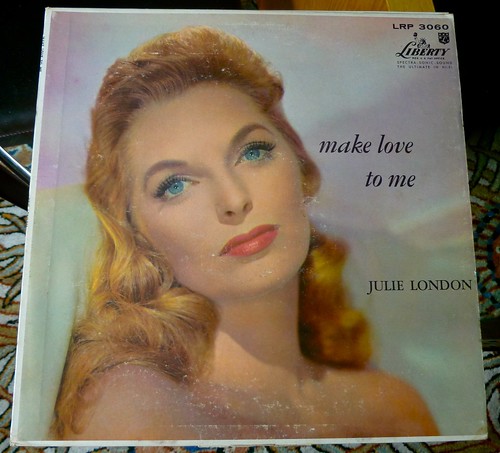I decided to listen to one album at a time — not that I'll endure all of them — and see what I think. I don't expect to recall my childhood memories or to reconstruct the inner life of the man who existed in ways that couldn't be understood by me at the time. I don't expect anything, really. The idea is simply to encounter these albums, because I have them, because he bought them, and because I know they have meaning, even though I don't think it is possible to find that meaning.
The first selection is "Make Love to Me," a 1957 collection of "standards" and "new pieces," sung by Julie London.

I pulled this one out of the stack because Julie London was my father's favorite singer. As a child, I had reason to believe that she was the most compellingly beautiful woman in the world. As I heard her singing, she was whispering. That was the gimmick: Whispering. Listening to it now, I hear how sexy it is intended to be to a man. I'm not sure whether it's completely subtle or a sledgehammer of sex. It's trying to be both in a way that would seem ridiculous or naive today, unless you could convince yourself that it's ironic. But it's not ironic.
The liner notes invite the listener — the male listener — to imagine Julie as an idealized young woman available for sex. Each song is connected to a city, even though the song lyrics are not about any particular place. The dreamy man — if he reads the liner notes — can picture himself in one city after another with the beautiful, love-seeking woman: "So steady your hand, pour the martinis — let your imagination go...."

My favorite song on the album was "Lover Man" — listen to it here — which the liner notes tells us is "Switzerland at sunset." I see little inked checks next to some of the songs — not including "Lover Man." I think I recognize my father's handwriting, and I assume he made cassette tapes and checked off the songs he wanted to copy. My second favorite is "Body and Soul," which did get a check.
How would I rate this listening experience? It did not take me back into the past. I don't remember hearing it or having childish ideas about what these songs meant. There's something wistful about thinking of my father feeling deeply attached to this kind of singing, which seems to be about teaching a young man how to "make love" to a woman. Key song: "Go Slow." (Not checked.) "Go Slow" supposedly takes place in Casablanca, according to the liner notes. "When love is slow, oooooh honey, what a tonic for my nerves." What a bad song! And when Julie does that "ooooh," she sounds a bit grossed out, like maybe it should be spelled "ew."






0 comments:
Post a Comment